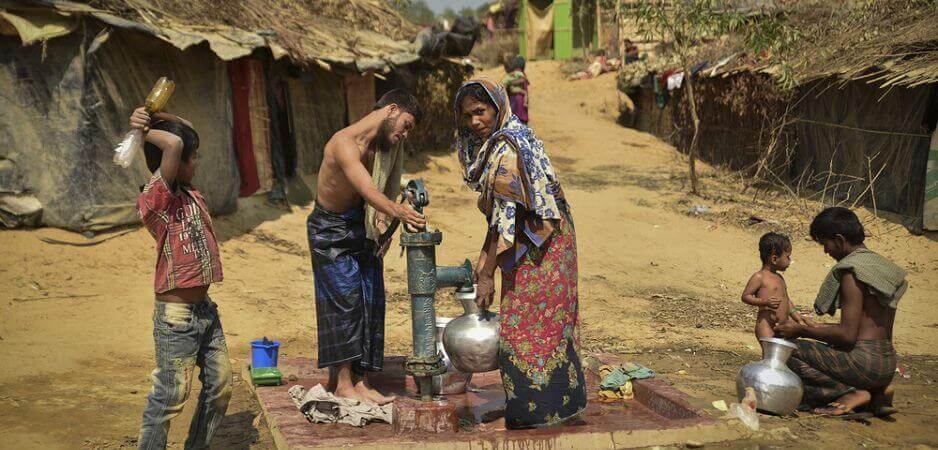In this guest edition of The Interview, Vishal Manve talks to Meenakshi Ganguly, the South Asia director of Human Rights Watch.
Rohingya Muslims, the “world’s most persecuted minority,” are fleeing from Rakhine State in Myanmar following a military crackdown and attacks by Buddhist nationalists. According to latest reports, approximately 370,000 Rohingyas have escaped since the violence began on August 25, with international media reporting on rising casualties, houses and villages being set on fire, and incessant usage of bullets.
Amid mounting pressure, Nobel laureate and Myanmar’s de facto leader, Aung San Suu Kyi, has previously termed “genocide” too strong a term. She has also refused to accept the plight of the Rohingya community and has canceled her trip to the United Nations General Assembly this month. Suu Kyi’s fellow Nobel contemporaries, including Pakistani activist Malala Yousafzai, South African rights activist Desmond Tutu and Tibetan spiritual leader the Dalai Lama, have criticized her silence. They have asked her to intervene, but regional nations such as India and China have also refused to speak out.
India’s junior home minister, Kiren Rijiju, recently announced the government was planning to deport 40,000 Rohingyas from the country due to security concerns. This led to public anger as international rights groups condemned the move, which could push Rohingyas back into nefarious conditions that threaten their lives. While the government later said it would review its decision, Rijiju again made a public statement, saying that India was committed to sending back Rohingya Muslims after the situation in Myanmar returns to normalcy.
In this guest edition of The Interview, Vishal Manve talks to Meenakshi Ganguly, the South Asia director of Human Rights Watch (HRW). They discuss the humanitarian crisis faced by Rohingyas fleeing persecution and India’s stand on it.
Vishal Manve: Rohingyas are facing persecution and fleeing to neighboring countries like Bangladesh and India. But upon arrival to India, they are again facing the risk of deportation. Should the Indian government reconsider its plea on humanitarian grounds?
Meenakshi Ganguly: The Rohingyas have long been a persecuted community in Myanmar. Since they are of a minority ethnicity and faith, the Burmese do not consider them citizens and would like, by fair means or foul (these days only the latter), to push them out. They seem to be succeeding. More than 370,000 Rohingya people have arrived in Bangladesh since this most security crackdown following a militant attack on August 25. That is, in the space of a few weeks, the Burmese have successfully pushed out a third of the Rohingya population. This has all the hallmarks of an ethnic cleansing.
Bangladesh already hosts over 3 to 5 lakh [300,000 to 500,000] Rohingya from previous Burmese military crackdowns, or because the Rohingya chose to leave for a more secure life. Some of them, only 40,000 of the hundreds of thousands that have fled, ended up in India.
It is unfortunate that the Indian authorities did not take the time to understand the Rohingya history of desperation before announcing their deportation. It appears now that more informed decision-makers are taking the lead.
India should protect its citizens from all security threats, but it is irresponsible to suggest that all Rohingya refugees are such a risk. As with any community, anyone that breaks the law should be prosecuted.
Manve: What message do you and HRW have for the Indian government?
Ganguly: We welcome the decision of the Indian authorities to hold back on any plans to deport the Rohingya. It is important also for the political leadership to not suggest that the 40,000 Rohingya in India are all a security risk. It places Indian authorities at risk of being accused of religious profiling since the Rohingya are Muslims. It also places the Rohingya Muslims at risk of vigilante violence, considering the spate of mob attacks and killings by groups that claim to be supporters or affiliates of the ruling BJP [Bharatiya Janata Party].
It is true that these recent crackdowns in Myanmar were sparked by a militant attack on August 25. We don’t have much detail yet because the Burmese authorities have not allowed any independent investigations in Rakhine State. However, a community that has been left effectively stateless and victim to numerous abuses does try and seek refuge elsewhere. And for some, it becomes a recruiting ground for militancy.
Apart from its moral obligations to call upon the Burmese leadership and particularly the military to end these egregious abuses, it is also in India’s interest to do so since it is concerned both about an in-flow of refugees and possible security implications.
Manve: India has previously accepted Tibetans, Afghans and Sri Lankan’s escaping persecution in their home country, but suddenly there was a policy shift in 2016 that has since led to the current government discriminating against Muslim refugees. What’s your take?
Ganguly: Yes, India has a long history of providing sanctuary to refugee communities. While the ruling BJP government repeatedly insists that it wants to pursue an equitable development policy, India is facing international criticism for attacks on Muslims and other minority communities by groups affiliated to the BJP or RSS [Rashtriya Swayamsevak Sangh]. The government insists it condemns these attacks, but any policy, including by the US administration, that suggests a particularly discriminatory approach towards Muslim refugees is unfortunate and an irresponsible populist response to a greater problem.
There have been terror attacks by Islamic extremists. But a blanket denial of sanctuary to anyone of the Muslim faith violates international principles of protecting human rights.
Manve: Can the Rohingya crisis be officially termed as “genocide” perpetrated by Myanmar’s government?
Ganguly: Yes, the UN high commissioner for human rights has described this as ethnic cleansing.
Manve: How can the world help Rohingya Muslims — global leaders, countries or organizations? How can they respond to the crisis?
Ganguly: There is an immediate need for a humanitarian response to assist the refugees in Bangladesh and the hundreds of thousands, including Rakhine Buddhists and other communities, [who] are displaced in Rakhine State. The Burmese authorities insist that all the violence and arson is perpetrated by the Rohingya themselves or by militants. They offer no evidence but refuse to accept credible accounts that offer a contrary view. If the Burmese military is so sure that its hands are clean, why resist an international investigation? The international community, the UN, and other organizations should press for immediate access to humanitarian aid workers and to international investigators, including a UN fact-finding team that has been denied entry by Myanmar.
Manve: Press freedom and the adherence to global commitments, including helping refugees fleeing war, are some of the hallmarks of democratic nations with strong institutions. How can civil society in India counter the current narrative of hate and vitriol to protect rights, values and the ethos enshrined in the constitution?
Ganguly: This is a challenge to civil liberties around the world. People fearing terror attacks, or a loss of livelihood, believe that compromising on human rights will solve the problem. That is just populist rhetoric to win votes. There needs to be much more work to end the hate and suspicion that has brought the world to devastating violence in the past
 Manve: Shifting from the Rohingya Muslims, recently a journalist, Gauri Lankesh, was murdered by gunmen in Bangalore. Do you think the government is not doing enough to curb Twitter trolling and threats to abusers who target journalists?
Manve: Shifting from the Rohingya Muslims, recently a journalist, Gauri Lankesh, was murdered by gunmen in Bangalore. Do you think the government is not doing enough to curb Twitter trolling and threats to abusers who target journalists?
Ganguly: Instead of curbs on trolling, though unfortunate and ugly, the [Indian] government should examine the real threats and incitement to violence. It should take all steps to ensure that those that killed or conspired to kill Gauri Lankesh are brought to justice.
And India, which has long celebrated its democracy, should acknowledge that it is slipping up on protecting free speech. Criticism is no doubt unpleasant, but for a state that is committed to upholding constitutional rights, engaging with civil society always offers options for course-correction. Instead, we now see an effort to end dissent both by misusing sedition, criminal defamation, and other laws and by threats from interest groups.
Manve: The prime minister of a country who follows those promoting violence against free voices: How does this reflect on India?
Ganguly: The prime minister [Narendra Modi] has an enormous following not just on social media. His popularity ratings are high. He should use this to promote harmony [and] protect constitutional freedoms.
The views expressed in this article are the author’s own and do not necessarily reflect Fair Observer’s editorial policy.
Photo Credit: Hafiz Johari / Shutterstock.com
Support Fair Observer
We rely on your support for our independence, diversity and quality.
For more than 10 years, Fair Observer has been free, fair and independent. No billionaire owns us, no advertisers control us. We are a reader-supported nonprofit. Unlike many other publications, we keep our content free for readers regardless of where they live or whether they can afford to pay. We have no paywalls and no ads.
In the post-truth era of fake news, echo chambers and filter bubbles, we publish a plurality of perspectives from around the world. Anyone can publish with us, but everyone goes through a rigorous editorial process. So, you get fact-checked, well-reasoned content instead of noise.
We publish 2,500+ voices from 90+ countries. We also conduct education and training programs
on subjects ranging from digital media and journalism to writing and critical thinking. This
doesn’t come cheap. Servers, editors, trainers and web developers cost
money.
Please consider supporting us on a regular basis as a recurring donor or a
sustaining member.
Will you support FO’s journalism?
We rely on your support for our independence, diversity and quality.






